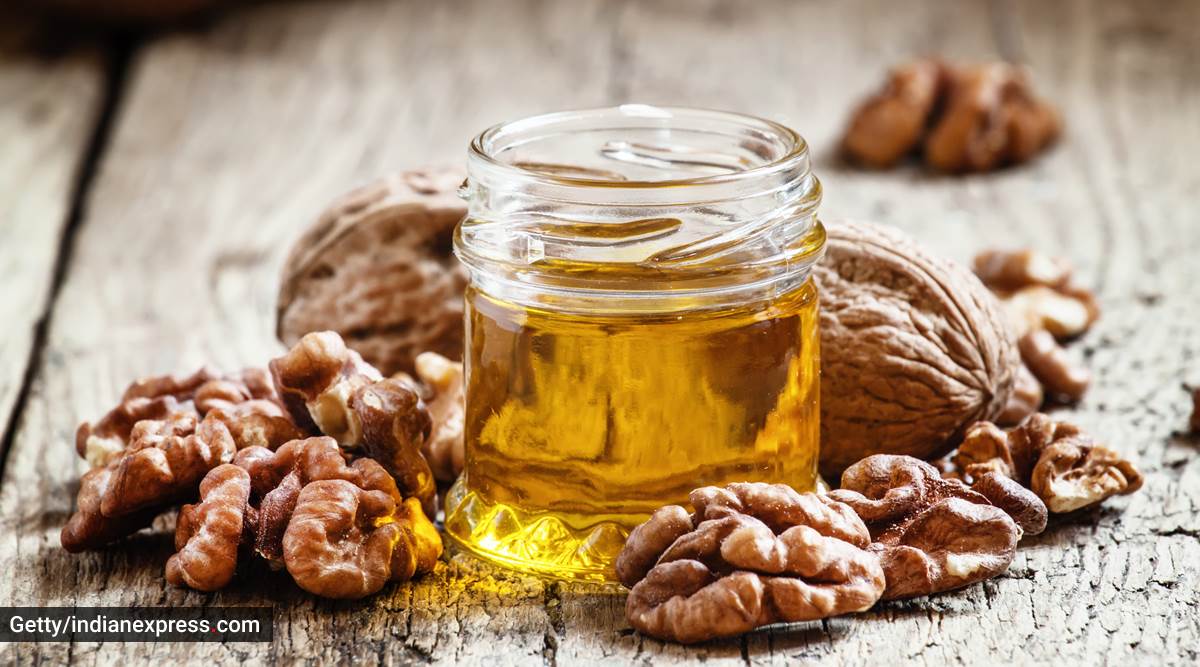📣 For more lifestyle news, click here to join our WhatsApp Channel and also follow us on Instagram
For cooking, sautéing, or frying: Here’s how to pick the right type of oil for good health
"When the smoke point of oil is achieved, it becomes unstable and begins to break down," said Garima Goyal, a registered dietitian
 Here's what to consider when it comes to using oils (Source: Getty Images/Thinkstock)
Here's what to consider when it comes to using oils (Source: Getty Images/Thinkstock)We use different types of oils – mustard, refined, olive, sesame, coconut — to cook out foods on an everyday basis. But have you ever given a thought to which one suits your requirement (or your cooking) the most, and also helps improve the many health and fitness parameters? Addressing this subject, Priya Nagwani, a biotechnologist-turned-nutritionist, took to Twitter to share an engaging thread highlighting the importance of using different types of oil for different purposes.
“Using the right cooking oil goes a long way in overall good health,” Nagwani wrote.
As a nutritionist, one of the questions I get asked often: Which cooking oil is the best? Refined oil or olive oil? Mustard oil or ghee?
Using the right cooking oil goes a long way in overall good health.
Here’s a thread demystifying cooking oils & help you choose the right one
— Priya Nagwani (@priya_nagwani) February 5, 2023
What to consider when picking an oil?
According to Nagwani,
The three things that you should consider include:
1) Smoke point of the oil
Just like liquids have boiling points, oils have smoke points. “Unlike water, which starts boiling at a certain temperature, oils catch fire and burn when heated beyond their smoke point and release harmful chemicals,” Nagwani noted, adding that when cooking something that only involves sautéing/shallow frying, you can choose an oil with low smoke point. However, deep frying/cooking on high heat needs oils with high smoke point which are more suitable. “That is why blindly using olive oil for Indian cooking (which involves frying) is not recommended,” she added.
Agreed Garima Goyal, a registered dietitian, and explained that when the smoke point of oil is achieved, “oil becomes unstable and begins to break down”. “This oxidation of oils releases free radicals that are responsible for cellular degeneration and disease formation,” she told indianexpress.com.
2) The manufacturing process
Different types of oil have different manufacturing/extraction processes. “Few oils like soyabean, canola, safflower (seed oils) are extracted using solvents like hexane. Post extraction, some heat, steam and pressure is used to desolventise it,” Nagwani pointed out. “In simple words, they are highly processed and refined. Processing and refining results in a lot of unstable molecules that can damage your cell membranes. On the other hand, oils like olive oil, coconut oil etc. are easily extracted w/o any refining. Same is true for butter and ghee,” Nagwani elaborated.
 Olive oil is a good source of MUFA (monounsaturated fatty acids) and omega 3 (Source: Getty Images/Thinkstock)
Olive oil is a good source of MUFA (monounsaturated fatty acids) and omega 3 (Source: Getty Images/Thinkstock)
3) Types of fats (fatty acids)
There are mainly 4 types of fats:
– Saturated fats
– Monounsaturated fatty acids (MUFA)
– Polyunsaturated fatty acids (PUFA)
– Trans fats
Every oil has a mix of saturated, monounsaturated fatty acids (MUFA), polyunsaturated fatty acids (PUFA) and little bit of trans fats (in traces), what differs is their ratio. Butter/ghee are high in saturated fats, olive oil/mustard oil are high in MUFA, while seed oils in PUFA, mentioned Nagwani.
“You need to have a healthy mix of all fatty acids in your diet. As a rule of thumb, limit saturated fats to 20-30 per cent of your overall oil usage,” wrote Nagwani.
Here are the oils that Nagwani uses/recommends/avoids:
*Use butter/olive oil/sesame oil for omlettes and sautéing vegetables, and cook them on low to medium heat
*Use mustard oil/cold pressed coconut oil for cooking vegetables
Goyal added that since refined coconut oil has a neutral taste, and a smoke point of 232 degrees Celsius, it makes for an ideal choice for sautéing, baking, or roasting, while virgin coconut oil can be used only up to 177 degrees Celsius and can be used in baking.
*Use ghee for chapatis
*Avoid seed oils
According to Goyal, walnut oil or flax provide heart healthy, cancer preventive and anti inflammatory nutrients, but they have a relatively lower smoke point: walnut oil has a smoke point of 160 degrees Celsius, while flax has a smoke point of 107 degrees Celsius. “So, reserve it for cold preparations such as salad dressings,” she suggested.
 Walnut oil has a smoke point of 160 degrees celsius (Source: Getty Images/Thinkstock)
Walnut oil has a smoke point of 160 degrees celsius (Source: Getty Images/Thinkstock)
What else to keep in mind?
*For anything deep fried, use ghee because it is less processed and has a high smoke point.
*Use extra virgin olive oil (EVOO) in hummus/salad dressings
Goyal noted that it is best to use EVOO for cold dishes such as in dips, salads and dressings. “Light olive oil also has similar health boosting properties like EVOO. Since its smoke point is a little higher than EVOO at 243 degrees celsius, a little high temperature cooking such as sautéing, roasting and grilling can be easily done. Baking can also make use of olive oil but only caution to be observed is that its flavour is a bit overpowering,” Goyal said.
*Avoid reheating oil as it increases the ratio of trans fats in the oil
📣 For more lifestyle news, follow us on Instagram | Twitter | Facebook and don’t miss out on the latest updates!
📣 For more lifestyle news, click here to join our WhatsApp Channel and also follow us on Instagram



- 01
- 02
- 03
- 04
- 05
























